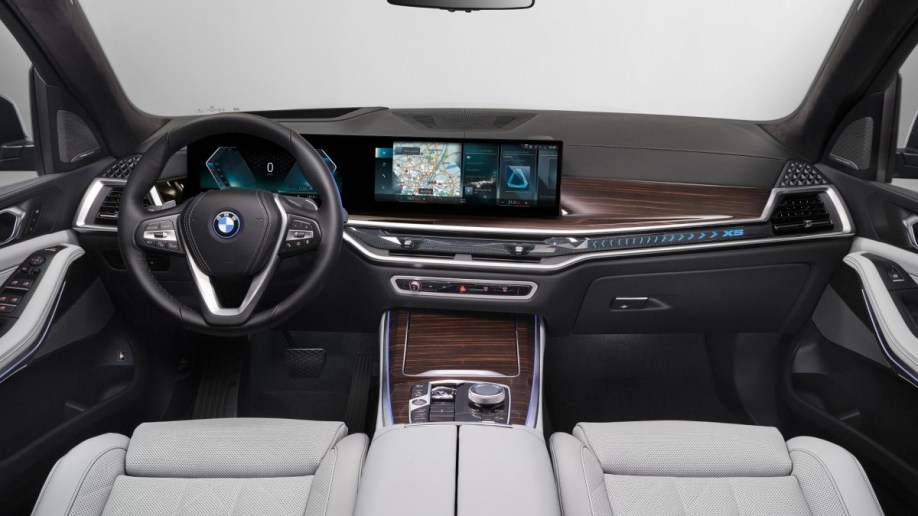
Drivers have been clear – they don’t like this idea.
Many automakers are preparing for it anyway.
But there’s a third party in the debate. Car dealers are beginning to weigh in. They’re against the idea. Or perhaps they’re against it unless they get their cut (hence the asterisk in our headline). The issue is evolving quickly.
More and More, Automakers Back Subscriptions
Most of today’s new cars are always connected to the internet. This could reshape the auto industry and the way Americans think of owning a car.
Traditionally, shoppers select the features they want on their car at the time of purchase. They then pay a fixed price for the car, or take on a loan with monthly payments that don’t fluctuate, to drive it home. Automakers often bundle features into trim levels or packages – if you want the heated seats, you have to pay for a premium audio system and leather steering wheel, too — to make building cars in bulk easier.
Connected cars, however, mean that automakers can track and communicate with your new vehicle long after you drive it home.
Some have begun experimenting with features they can switch on and off remotely.
That could radically reshape how cars are built.
Automakers could build every feature into every car that leaves the factory, dispensing with the idea of trim levels and options entirely. That simplifies their supply chains and production processes, saving them money.
They could then activate or deactivate features at any time.
Owners could subscribe – a monthly fee for the heated steering wheel, for instance, or separate monthly fees to use four, eight, or all 16 speakers built into your car. The idea wouldn’t work for non-electronic features like leather seating. But it could work for heated seats, sets of audio speakers, and even horsepower and suspension tuning, all of which are increasingly software-controlled.
BMW is experimenting with the idea in the U.S. market. Mercedes, too. That company now allows owners of its electric cars to pay a yearly fee for added horsepower.
Both Hyundai and General Motors, meanwhile, have told investors they plan to sell subscription services.
The End of Car Ownership?
Some buyers might like the added flexibility.
Owners could adjust their monthly payments to reflect their financial circumstances. They could turn off features when they’re not necessary. And owning a luxury car could be more in reach for some people if their existing car could grow more luxurious with a few taps in a phone app.
But it could also end the idea of ever paying off your car.
Even buying a used car might not save you from the fees. Automakers could continue to charge subscription fees for car features regardless of how many hands a car had passed through.
Many say it’s not a worthwhile trade. In a 2022 survey, Kelley Blue Book parent company Cox Automotive found that just a quarter of shoppers say they’d consider paying subscription fees.
They may have an ally in the fight because of the weird nature of car sales in America.
The Car Business Is Weird
The car business is unlike any other.
The companies that build cars and the companies that sell cars are sometimes partners and sometimes rivals. These days, their enmity is showing up in state legislatures, where one side is lobbying to change the other’s plans.
A handful of relatively young automakers, like Tesla and Rivian, sell cars directly to buyers through their websites. But most automakers selling cars in the U.S. sell through dealerships they don’t own.
A car dealership is a third-party business that buys cars from factories and sells them to buyers. They work closely with automakers and often have the exclusive right to sell a brand in a particular area. But they are separate businesses and don’t always have the same interests.
Car sales are governed by state law, so dealership groups often band together to try to influence state legislatures. Increasingly, they’re talking to legislatures about in-car subscriptions.
Lobbying Just Beginning
Trade publication Automotive News reports that several legislatures “want to spell out dealers’ role in participating in future subscription revenue that automakers may seek to activate with over-the-air software updates.”
Last year, a pair of New Jersey lawmakers proposed an outright ban on in-car subscription services. In January, a group of Massachusetts legislators introduced a similar bill. That bill specifically states that “No dealer of a motor vehicle shall offer or charge to a consumer a subscription service for any motor vehicle feature,” leaving open the question of whether automakers themselves could charge such fees.
Dealer groups in other states, AN reports, are “backing legislation to amend franchise laws that govern the relationship between dealerships and the automakers whose brands they sell.” That could include eliminating subscriptions or requiring some revenue from subscription fees to go to dealerships.
Len Bellavia of Bellavia Blatt in Mineola, N.Y., a law firm representing dealers on franchise law issues, tells AN that automakers would essentially be selling cars “in a piecemeal fashion” by selling subscriptions to their parts.
“That will take a huge amount of revenue away from each dealership going forward and continuing each year,” Bellavia said.







